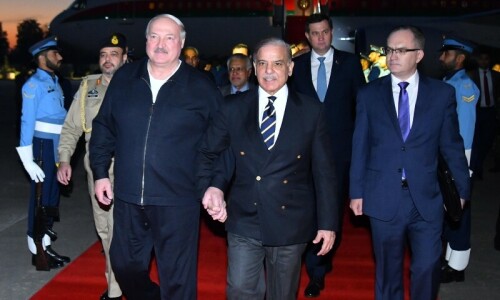The continuing furore over the events leading up to the Abbottabad raid in which Osama bin Laden was killed is perhaps inevitable given the unwillingness of all sides to publicly acknowledge the issues.
Consider the latest twist in the public debate. In response to a leaked letter purporting to show that the then-PPP government conspired to presumably allow US spies into the country en masse, former prime minister Yousuf Raza Gilani has demanded an explanation for how Bin Laden lived undetected inside Pakistan for many years and how US forces were able to penetrate Pakistani airspace and launch a ground operation.
Mr Gilani is right, but his riposte does not address the principal though unspoken allegation against the PPP: the security establishment’s concern that alleged secret cooperation between the PPP and the US government was meant to somehow either undermine the military’s authority or subvert the national interest.
Therein lies the problem. The historical civil-military strife reached another high point in the early years of this decade as Pak-US relations plunged to another low. Bin Laden was the world’s most wanted terrorist, so merely helping to track him down should not have been cause for a significant civil-military rupture.
The Bin Laden episode, then, was an indication of a deeper malaise: the civil and military sides of the state had drifted apart to the extent that both sides believed the other was out to harm it. Indeed, in the dredging up of allegations that the PPP facilitated American spies, the original fear is detectable — namely, that the US was interested in far more than simply tracking down Al Qaeda and was perhaps conducting espionage against India- or Afghan-centric jihadi groups tolerated by the state here at the time, or even gathering information on Pakistan’s nuclear programme.
Therefore, any political facilitation to the American effort, even if narrowly focused on Al Qaeda, was viewed with immense suspicion and hostility by the security establishment.
Whether the political government was unduly careless or the security establishment overly paranoid can perhaps be answered with the unveiling of the Abbottabad Commission report. Mr Gilani was again correct in demanding that the report be made public — the people deserve to know the facts and the state needs to absorb the lessons from the tumultuous Bin Laden episode.
But the current national furore suggests that the more fundamental questions, about who is to steer national security and foreign policies and based on which principles, remain contested.
Ideally, the civilian and military leaderships should find a way of working together until constitutionally mandated civilian leadership in all policy domains becomes the norm.
However, harmful old suspicions still appear to lurk in the background, undermining the trust of both sides in the other. The true national interest cannot be served if legitimate policy differences are either denied or regarded as anti-state.
Published in Dawn, March 27th, 2017












































